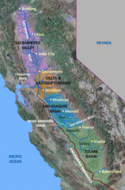In Ghana, about 80 percent of the working-age population is self-employed in an economy of improvisation and self-reliance where the quest to make a living is played out daily. The complexity of operating in the business environment — characterized sometimes as fetching water with a basket — has deterred many entrepreneurs from upgrading their business skills, raising capital and taking risks to grow. read more »
Policy
A Partnership-Driven Process to Promote Entrepreneurship in Ghana
- Login to post comments
California: The Economics of Delusion
In Sacramento, and much of the media, California is enjoying a “comeback” that puts a lie to the argument that regulations and high taxes actually matter. The hero of this recovery, Gov. Jerry Brown, in Bill Maher’s assessment, “took a broken state and fixed it.” read more »
- Login to post comments
America Without Immigration 2015-50
Be careful what you wish for, if that is what you wish for.
Except for the oil shocks of the 1970s and a few other recessionary years, the US economy has generally been strong in the postwar era since 1945. Huge advances in technology and trade, a favorable business environment and strong demographics combined to create tens of trillions of dollars of new wealth in the US and around the world. read more »
- Login to post comments
Zika, Rio And The Rising Health Hazards Of Megacities
In 2009, when Rio de Janeiro was awarded the Summer Games, many saw it as a validation of Brazil’s ascension on the world stage. Yet seven years later, this estimation seems to have been a bit premature, as Rio and other Brazilian cities struggle to meet the basic needs of the Olympians. read more »
- Login to post comments
Ireland Adopts Plan to Increase Housing Supply and Improve Housing Affordability
The government of Ireland has adopted a new policy (Rebuilding Ireland: Action Plan for Housing and Homelessness) intended to improve the quality of life and the national economy by making housing more affordable. read more »
- Login to post comments
Lessons Learned from Long-Term Privatizations
Is long term privatization of government assets in the form of leases or concessions a good idea?
The answer is not Yes or No but rather What and How.
Done right, long-term privatization can be a great thing to the public. But given the multi-decade nature of some of these deals, the risk of getting it wrong is high. read more »
- Login to post comments
A Different Approach to Redevelopment
As part of a thought experiment I examined one specific neighborhood in a typical small city in Georgia. I’m using this town not because it’s unique, but because it’s absolutely normative. I could do the same analysis on the town where my mom, sisters, and brother live in southern New Jersey and it would be nearly identical. This is Everytown, USA. read more »
- Login to post comments
Outer California: Sacramento Sends Jobs (and People) to Nashville
A reader comment on a feature by John Sanphillipo (“Finally! Great New Affordable Bay Area Housing! Caught my eye.”). The comment ("You shouldn't have to go to Nashville") expressed an understandable frustration about the sad reality that firms leaving coastal California often skip right over the Central Valley “where the housing costs are reasonable, there are some lovely old homes on tree lined streets, the humidity is less, the mountains are nearby, and you can drive there in 2-3 hours rather than fly.” read more »
California's State Religion
In a state ruled by a former Jesuit, perhaps we should not be shocked to find ourselves in the grip of an incipient state religion. Of course, this religion is not actually Christianity, or even anything close to the dogma of Catholicism, but something that increasingly resembles the former Soviet Union, or present-day Iran and Saudi Arabia, than the supposed world center of free, untrammeled expression. read more »
Health and Class
Late last year, economists Anne Case and Angus Deaton published a paper in the Proceedings of the National Academy of Science documenting the rising morbidity and mortality in mid-life white men and women in America, especially for those with a high school degree or less. They attributed this increase, a reversal of historic trends, to an epidemic of alcoholism, other drug use disorders, and suicide. Their findings are a wake up call for the US. Not only is something seriously wrong — it’s getting worse. read more »





















